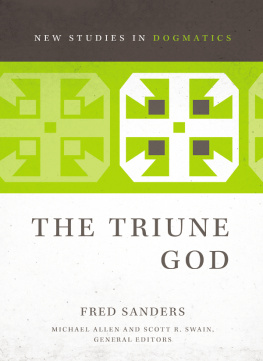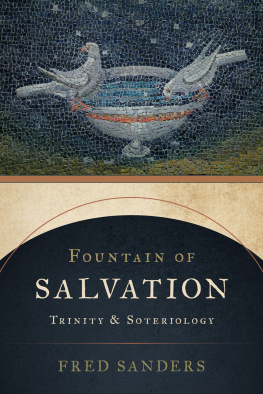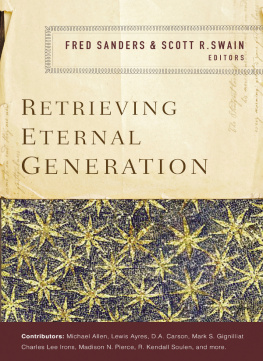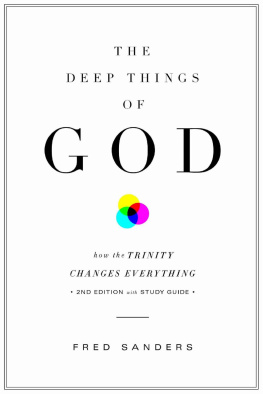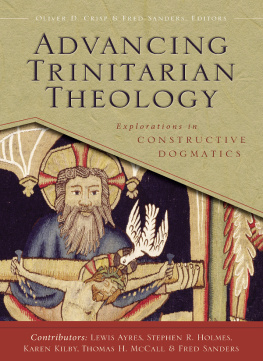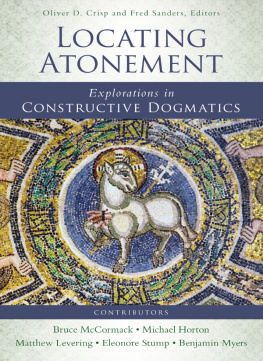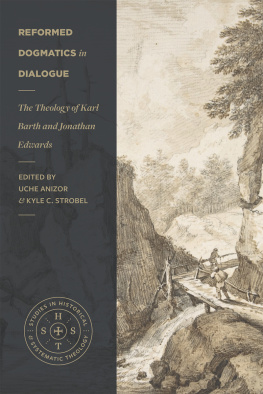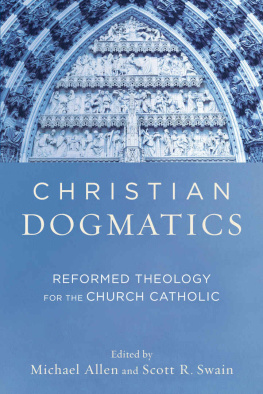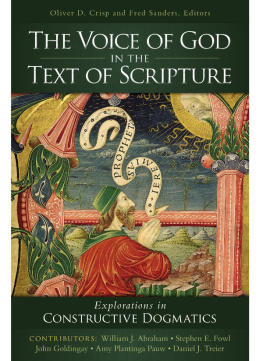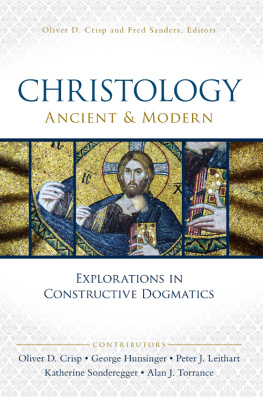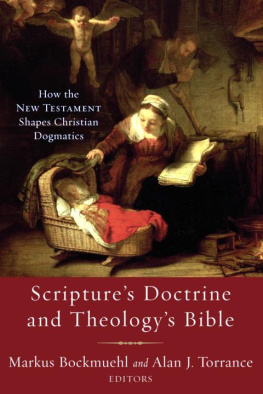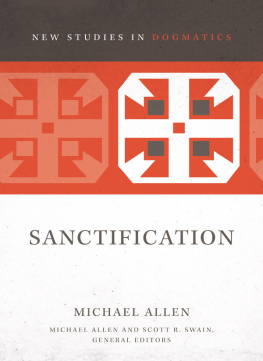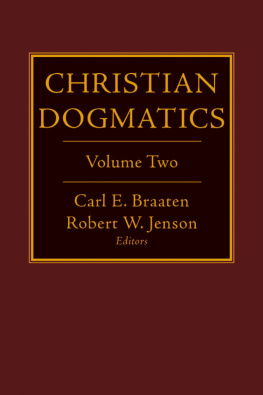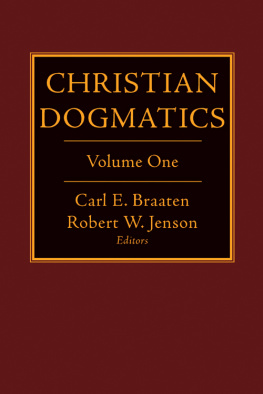PRAISE FOR THE TRIUNE GOD
Beginning with doxology, rooted in Scripture, and centered on the missions of the Son and the Spirit, this book is a lucid, rich, lively, and timely reframing of Trinitarian theology, with highly fruitful implications for dogmatics and exegesis.
Suzanne McDonald,Professor of Systematic and Historical Theology, Western Theological Seminary, Holland, MI
In contemporary theology, the doctrine of the Trinity is the subject of intense discussion and debate. Meanwhile, the theological interpretation of Scripture has reemerged in recent years. In this erudite, articulate, and delightful book, Fred Sanders makes very important contributions to both fields. Here a leading scholar of the doctrine offers helpful insights that will repay careful study. Even better, he leads us to a more profound doxology. I highly recommend this volume.
Thomas H. McCall,Professor of Biblical and Systematic Theology, Trinity Evangelical Divinity School, Deerfield, IL
Evangelical theologians are at the forefront of a new Trinitarian revival, one rooted in Scripture and common classical Christian traditionand Fred Sanders is a key voice in that revival. He offers a clearly written and succinct Trinitarian theology that is greatly to be welcomed.
Lewis Ayres,Head of Department and Professor of Catholic and Historical Theology, Durham University
SERIES EDITORS
Michael Allen, Associate Professor of Systematic and Historical Theology, Reformed Theological Seminary, Orlando, Florida, USA
Scott R. Swain, Professor of Systematic Theology, Reformed Theological Seminary, Orlando, Florida, USA
ADVISORY BOARD
John B. Webster, Professor of Divinity, St Marys College, University of St Andrews, Scotland, UK
Kevin J. Vanhoozer, Research Professor of Systematic Theology, Trinity Evangelical Divinity School, Deerfield, Illinois, USA
Katherine Sonderegger, Professor of Theology, Virginia Theological Seminary, Alexandria, Virginia, USA
Henri Blocher, Professor of Systematic Theology, Facult Libre de Thologie vanglique, Vaux-sur-Seine, France
ZONDERVAN EDITORIAL ADVISOR
Katya Covrett, Executive Editor, Zondervan Academic
ZONDERVAN
The Triune God
Copyright 2016 by Fred Sanders
Requests for information should be addressed to:
Zondervan, 3900 Sparks Dr. SE, Grand Rapids, Michigan 49546
ePub Edition October 2016: ISBN 978-0-310-49150-7
All Scripture quotations, unless otherwise indicated, are taken from the ESV Bible (The Holy Bible, English Standard Version). Copyright 2001 by Crossway, a publishing ministry of Good News Publishers. Used by permission. All rights reserved.
Scripture quotations marked NASB are taken from the New American Standard Bible. Copyright 1960, 1962, 1963, 1968, 1971, 1972, 1973, 1975, 1977, 1995 by The Lockman Foundation. Used by permission. (www.Lockman.org).
Scripture quotations marked ASV are taken from the Authorized Standard Version. Public domain.
Scripture quotations marked NRSV are taken from the New Revised Standard Version Bible. Copyright 1989 National Council of the Churches of Christ in the United States of America. Used by permission. All rights reserved.
Any Internet addresses (websites, blogs, etc.) and telephone numbers in this book are offered as a resource. They are not intended in any way to be or imply an endorsement by Zondervan, nor does Zondervan vouch for the content of these sites and numbers for the life of this book.
All rights reserved. No part of this publication may be reproduced, stored in a retrieval system, or transmitted in any form or by any meanselectronic, mechanical, photocopy, recording, or any otherexcept for brief quotations in printed reviews, without the prior permission of the publisher.
Cover design: Micah Kandros
Interior design: Kait Lamphere
16 17 18 19 20 21 22 23 24 /DHV/ 20 19 18 17 16 15 14 13 12 11 10 9 8 7 6 5 4 3 2 1
To Phoebe
I commend her to you, for she has been a helper of many, and of me also.
CONTENTS
DETAILED CONTENTS
New Studies in Dogmatics follows in the tradition of G. C. Berkouwers classic series, Studies in Dogmatics, in seeking to offer concise, focused treatments of major topics in dogmatic theology that fill the gap between introductory theology textbooks and advanced theological monographs. Dogmatic theology, as understood by editors and contributors to the series, is a conceptual representation of scriptural teaching about God and all things in relation to God. The source of dogmatics is Holy Scripture; its scope is the summing up of all things in Jesus Christ; its setting is the communion of the saints; and its end is the conversion, consolation, and instruction of creaturely wayfarers in the knowledge and love of the triune God until that knowledge and love is consummated in the beatific vision.
The series wagers that the way forward in constructive theology lies in a program of renewal through retrieval. This wager follows upon the judgment that much modern theology exhibits a stubborn tendency to grow not higher but to the side, to borrow Alexander Solzhenitsyns words from another context. Though modern theology continues to grow in a number of areas of technical expertise and interdisciplinary facility (especially in both the exegetical and historical domains), this growth too often displays a sideways drift rather than an upward progression in relation to theologys subject matter, scope, and source, and in fulfilling theologys end. We believe the path toward theological renewal in such a situation lies in drawing more deeply upon the resources of Holy Scripture in conversation with the churchs most trusted teachers (ancient, medieval, and modern) who have sought to fathom Christs unsearchable riches. In keeping with this belief, authors from a broad evangelical constituency will seek in this series to retrieve the riches of Scripture and tradition for constructive dogmatics. The purpose of retrieval is neither simple repetition of past theologians nor repristination of an earlier phase in church history; Christianity, at any rate, has no golden age east of Eden and short of the kingdom of God. Properly understood, retrieval is an inclusive and enlarging venture, a matter of tapping into a vital root and, in some cases, of relearning a lost grammar of theological discourse, all for the sake of equipping the church in its contemporary vocation to think and speak faithfully and fruitfully about God and Gods works.
While the specific emphases of individual volumes will vary, each volume will display (1) awareness of the state of the question pertaining to the doctrine under discussion; (2) attention to the patterns of biblical reasoning (exegetical, biblical-theological, etc.) from which the doctrine emerges; (3) engagement with relevant ecclesiastical statements of the doctrine (creedal, conciliar, confessional), as well as with leading theologians of the church; and (4) appreciation of the doctrines location within the larger system of theology, as well as of its contribution to Christian piety and practice.
Our prayer is that by drawing upon the best resources of the past and with an awareness of both perennial and proximate challenges to Christian thought and practice in the present, New Studies in Dogmatics will contribute to a flourishing theological culture in the church today. Soli Deo Gloria.
Michael Allen and Scott R. Swain

